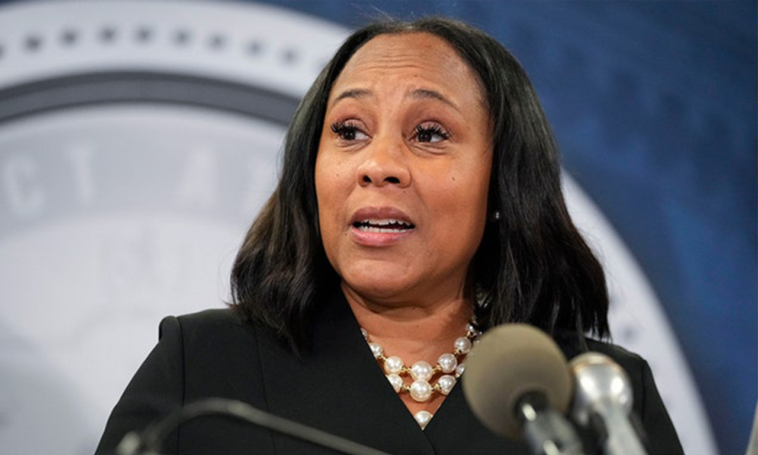The scheduled hearing on February 15 has become a focal point, addressing these claims that have emerged against the backdrop of Willis’s prominent role in prosecuting former President Trump on charges related to election interference.
The court documents filed recently have brought to light the assertion that Willis engaged Nathan Wade, supposedly her romantic partner, as the special prosecutor for the Trump case.
The allegations further contend that their relationship led to financial impropriety, highlighting extravagant vacations funded by the fees that Wade’s firm received for their work on the Trump prosecution. Despite the gravity of the accusations, Willis has chosen not to confirm or deny the claims, leaving the matter subject to legal scrutiny.
The complexity of this situation is compounded by Willis’s allusion to a potential racial bias in the attention focused on her relationship with Wade. Addressing the congregation at Big Bethel AME Church in Atlanta, Willis suggested that the scrutiny might be influenced by their race, stating,
“They only attacked one. First thing they say, ‘Oh, she’s gonna play the race card now.’ But no God, isn’t it them that’s playing the race card when they only question one.”
This narrative gains further traction as Michael Roman, Trump’s co-defendant in the Georgia case, alleges an “improper” and “clandestine” affair between Willis and Wade during pivotal stages of the 2020 election interference case.
Trump himself has weighed in on the matter, claiming that the district attorney is “totally compromised” and insisting that the case against him should be dropped due to these alleged improprieties.
The allegations surrounding Willis’s personal life and professional conduct have turned the legal proceedings into a political firestorm. Beyond the potential impact on the prosecution against Trump, these accusations raise broader questions about the intersection of personal relationships and professional responsibilities within the legal system.
If substantiated, the allegations against Willis and Wade not only jeopardize the credibility of the Trump prosecution but also shed light on the ethical considerations governing the conduct of high-profile legal officials.
The suggestion of a racial element in the scrutiny adds an additional layer of complexity to the controversy. Accusations of bias based on race in legal proceedings underscore the challenges faced by minority individuals occupying positions of authority. The response to these allegations will inevitably involve a nuanced examination of both the personal and professional dimensions of Willis’s conduct.
As the February 15 hearing approaches, the spotlight on Fani Willis intensifies. The legal community, political observers, and the public are eagerly awaiting the proceedings that will determine the validity of these claims and their potential repercussions on the high-profile case against Donald Trump. The intertwining of personal relationships, racial dynamics, and legal responsibilities makes this a complex and closely watched legal saga.
Beyond the immediate legal ramifications, the Willis-Wade saga prompts a broader conversation about the expectations placed on public officials and the consequences when those expectations are allegedly breached. The public’s trust in the legal system hinges on the integrity and impartiality of those who wield prosecutorial power.
The emergence of personal and financial impropriety allegations against key figures involved in a consequential case inevitably raises questions about the transparency and ethical standards within the legal arena.
The interconnected nature of personal relationships, racial dynamics, and the legal system exemplified in this case underscores the challenges of maintaining public trust in institutions. Whether Willis and Wade are vindicated or face consequences, the proceedings will undoubtedly leave a lasting impact on perceptions of justice, fairness, and accountability.



4 Comments
Leave a Reply4 Pings & Trackbacks
Pingback:Senator Tim Scott announced to endorse Trump
Pingback:Judge orders unsealing of divorce case involving Georgia special prosecutor
Pingback:NYC Mayor Eric Adams Says TikTok Is an ‘Environmental Toxin’
Pingback:Memphis police chief to serve in interim role under new mayor
Join the Community and Be a Part of the Conversation
You must be logged in or registered to post a comment.